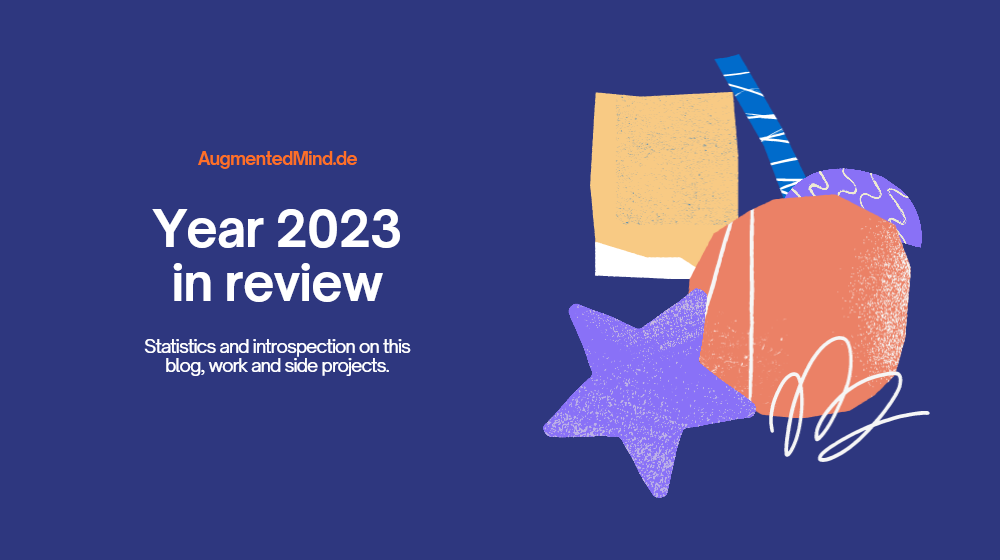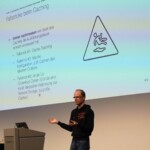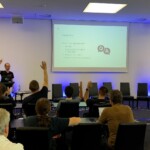The year 2023 has come to an end, so I took some time to reflect on my activities.
Website / Blogging – who is reading this anyway?
In 2020, I relaunched my personal website, using WordPress with the GeneratePress theme, which has been a good choice so far. In general, WordPress is quite good, except for the horrendously slow Gutenberg editor… (type a letter, wait for 0.3 seconds, see the letter appear in the editor). I’m forced to write long posts outside of WordPress, then copy them into WordPress afterwards.
Traffic analysis
Since 2020, my monthly user base has increased steadily, and is now roughly stable since 2022, with an average of 20-25k page views per month, with about 12k visitors per month. Thank you for your loyalty and for the interaction via dozens of comments that you posted.

About 39% of the visitors leave after opening the first page (a.k.a. “bounce rate”), which means that 61% of the visitors stay to read more. According to marketing experts, 61% is very good, but what do I know ;).
The following figure shows the referrers / traffic sources:
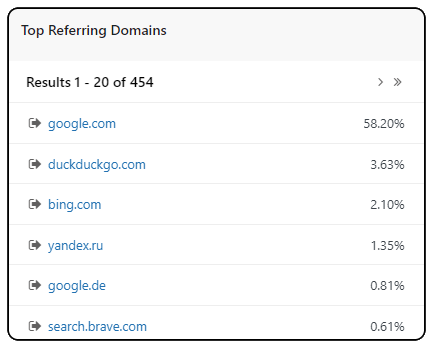
As you can see, almost all users come from search engines, and English-speaking google.com users are the vast majority.
Article analysis
In total, there are 89 articles on augmentedmind.de (this one included). 21 of those (including this one) were created in 2023 (see list), thus 20 articles (excluding this one) are of technical nature.
If we cluster them, some common topics emerge:
- 6 articles are about Docker (list)
- 5 articles are about improving your work efficiency (list)
- 4 articles are about Renovate Bot (list)
When writing articles, I make use of the Pomodoro technique (25 minutes of intensive uninterrupted work, 5 minutes break to regain concentration). Because I keep track of all Pomodoros (and the corresponding task), I can analyze how many of these Pomodoros I spent per article:
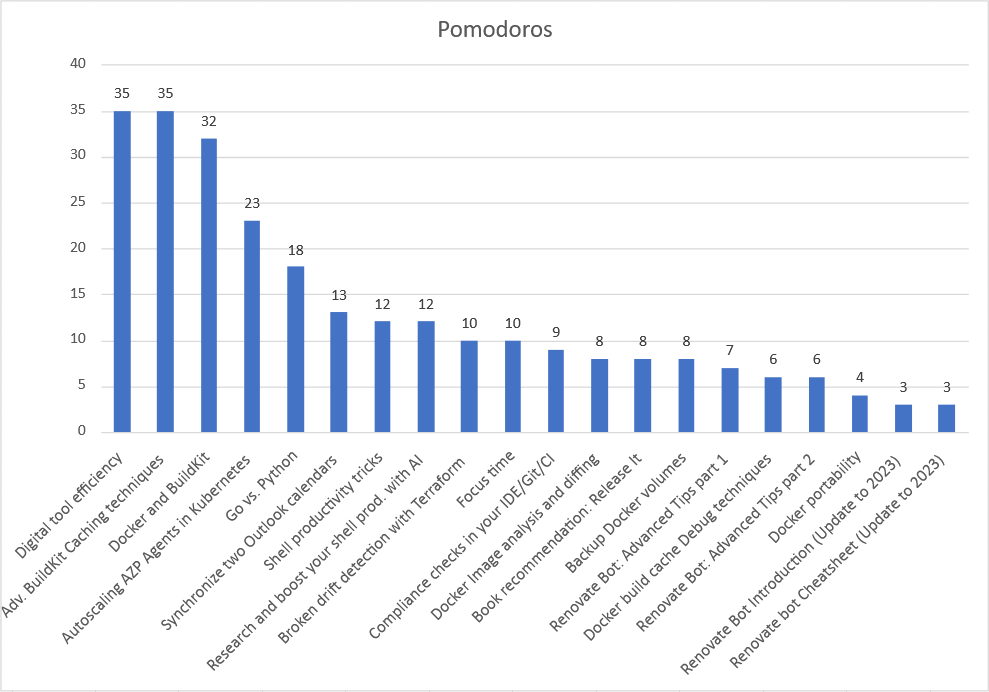
On average, this is about 13 Pomodoros per article, but the above distribution quickly shows that the statistical mean is in fact meaningless (pardon the pun). Articles are either a lot of work (beyond 30 pomodoros) or can be written in a day (12 pomodoros or less).
By dividing the Pomodoro count by 2, you’d get the approximate amount of hours I spent on each article. How do I manage spending so much time on writing? You will find out further below.
LinkedIn success analysis
Since the website relaunch, I’ve also been creating LinkedIn posts which advertise my 20 technical blog posts. However, LinkedIn only accounts for 285 visits of the overall ~250k visits, which is only 0.114% (and thus not listed in the above traffic analysis). So, on average, each LinkedIn post (that advertises one of my 20 technical blog posts of 2023) was clicked 285/20 = 14 times. Each of these posts have 500-800 LinkedIn impressions. This means that the click rate is somewhere below 14/500 = 2,8%, which, according to marketing experts, is apparently quite good.
Conclusion
Overall, I’m very happy how this blog has developed, even though the monthly user numbers have plateaued since last year. The main purpose of this blog is to help me understand the topics better, by teaching them. I also frequently come back to them to refresh my memory, or refer my colleagues to them. And according to the traffic analysis, most users come from search engines, so the posted material hopefully serves them, too.
I’m also happy about the LinkedIn numbers. After all, I don’t want to become a famous influencer, but focus on technical excellence and quality (over quantity). In 2024, I should be able to keep the pace of one to two articles per month.
Side projects / open source software development
In 2023 I created a lot of code in 9 GitHub projects.
Two of those are open source projects I already created in 2022, and I kept maintaining them throughout 2023:
- directory-checksum (GitHub): A CLI tool (written in Go) that recursively computes the checksum of the contents of a directory, and prints the checksums up to a depth you can specify. Useful to diagnose caching problems with Docker. I discussed the tool in this blog post. Thanks to Renovate Bot and the exhaustive test suite I built, all dependencies were fully automatically updated.
- Outlook calendar sync (GitHub): a Microsoft Power Automate flow that synchronizes two Outlook 365 calendars. Throughout 2023, I created 7 releases that add new features or fix bugs. I got a tremendous amount of positive feedback, via mail and blog post comments.
These are the seven new projects I created on GitHub in 2023:
- GitHub app installation token retriever tool (GitHub): a container-based CLI tool (written in JavaScript) that retrieves a GitHub App installation access token, given the App’s ID and private key. Can e.g. be used if you use GitHub Enterprise as code repo and run a self-host Renovate Bot instance outside of GitHub Actions. I managed to advertise my tool on the official Renovate documentation here. I developed the tool in April, and thanks to Renovate and automated end-to-end tests, new releases are continuously built using GitHub Actions workflows.
- Focus Time desktop app (GitHub): a CLI tool (written in Python) for Windows and macOS that runs silently in the background, querying your Outlook 365 or CalDAV calendar once per minute to find focus time events. It then runs a series of Terminal/Bash commands (that you define) whenever such an event starts or ends. There are special commands to turn the focus mode of your operating system on or off. I present the tool and more background in this blog post.
- Kubernetes Operator for Azure Pipeline Agents (GitHub and companion-tool GitHub): A Kubernetes operator (written in Go) that provisions elastically-scaling Kubernetes Pods that run Azure Pipelines agents and other sidecar containers. I provide a detailed introduction and tutorial for the operator in this blog post.
- In progress:
- Renovate Bot Pull Request visualization (GitHub): a turnkey solution (written in Python) that renders a visual dashboard that illustrates how your technical debt (regarding outdated dependencies) has been evolving over time. I will go into more details in a future blog post.
- Benchmarking (GitHub + GitHub): for an article series about hardware benchmarking (that I will post throughout January+February 2024), I built tooling that automatically benchmarks (virtual) hardware that underpins container-based environments, such as Kubernetes. Stay tuned!
Books and time tracking – using ketchup
This year, I focused on building software rather than reading books, but I did finish the following technical books in 2023, which I can highly recommend.
- Slack (DeMarco): describes how allowing your workers more “slack” (time), you make your organization more agile, so that it can better adapt to market needs.
- Building Microservices, 2nd edition (Newman): provides a broad overview of all aspects related to microservices, including design, build, deploy, test, observability, security, resiliency, scalability, or how to distribute ownership.
- Cloud Strategy (Hohpe): this book is all about understanding the pros and cons of clouds (on a meta-level) and how to make informed decisions that navigate through the sea of buzz words.
I might publish my respective personal book summaries some time in 2024.
I also keep track of the Pomodoros I spent on reading these books, as well as working on the blog. Since May 2023, I also track the time spent on my open source side projects / apps:
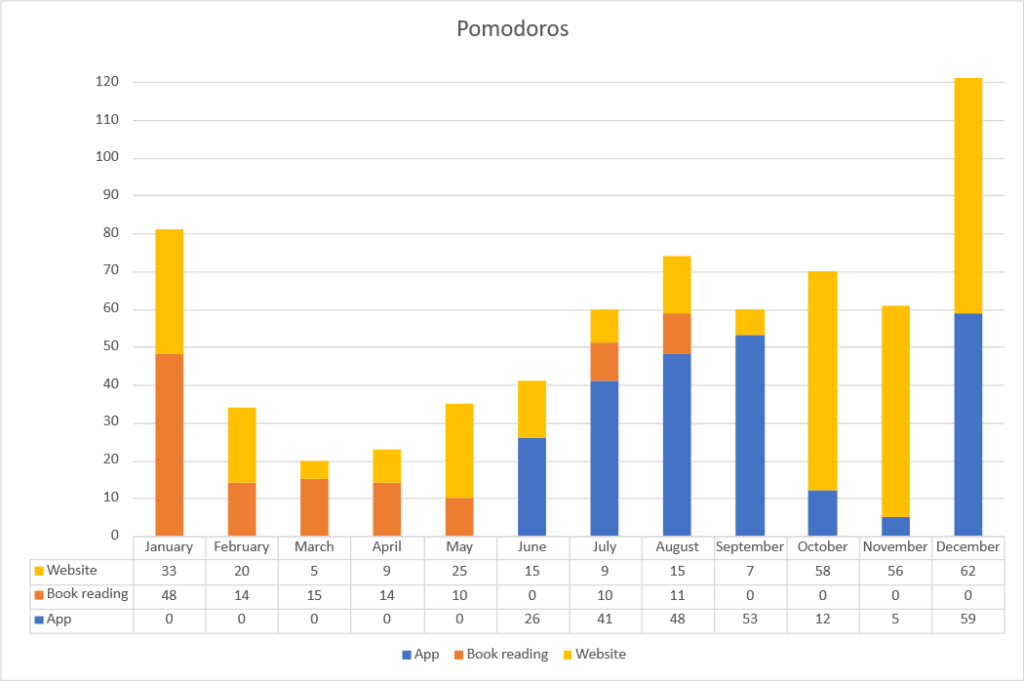
In total, I’ve spent around 680 Pomodoros in 2023 on all 3 categories. Dividing this number by 2 (to get hours) and by 40 (to get a full time working week), this is an equivalent of more than 8 weeks (or 2 months) of work. The “trick” is that I only have a 80% day job. Wednesdays are off, so I can afford spending this much time on hobby projects without being a “loner”.
Other work stuff and conferences – traveling and speaking
In August 2022, I switched jobs from Fraunhofer FIT to SprintEins. There, I’ve transitioned into a lead role soon after (10/2022 – 06/2023), becoming one of the Domain Leads of the domain “Release Engineering and Deployment” (a.k.a. READY). At SprintEins, I’ve contributed to a total of four projects in 2023, focusing on improving cloud engineering and CI/CD automation, and fostering synergies between project teams.
I’ve also created a SprintEins-internal training workshop about the essentials of what the READY domain does, explaining topics like cloud, automation or observability in simple terms, so that everyone at SprintEins understands what kinds of problems we solve. Already more than 20% of our staff have attended the workshop, which I held three times since September 2023. Thank you all for taking an interest.
I also attended these conferences in Germany, both as an attendee and speaker:
- CloudLand, which took place in June in Phantasialand in Brühl. I had a talk about the Optimization of CI/CD Pipelines, and initiated a bar camp session about how to do operations in the cloud (see here). I also had the chance to do a little “acting”, as I was accompanied by our SprintEins videographer, Gonzalo. You can find the Video on LinkedIn here.
- ContainerConf, held in November in Mannheim. Here, I presented a very similar talk, this time in German, and was fortunate enough to be given the chance to present on the main stage.
I’d like to thank my employer (SprintEins) and the conference committee for making my talks possible. I highly recommend both conferences. In general, conferences are excellent opportunities to meet likeminded individuals and experts, as well as to learn about new topics in your field. However, be prepared to spend extra time after the conference, further exploring those just-discovered topics that really interest you.
Outlook for 2024
What is to come next year?
Regarding my blog, I have a plethora of ideas. I’ll start off by posting a 4-part series about (virtual) hardware benchmarking. The goal is to find the best / cheapest hardware offered by cloud providers. But there are other ideas, e.g. book summaries, discussing the current state of “documentation as code”, refreshing my Docker optimization guide, more about Renovate Bot, or a (proper) introduction to Azure Pipelines (similar to my GitLab introduction article).
As for my side projects, I will keep maintaining most of them, but most likely not start (m)any new ones. One exception is that I want to convert the CLI-based Focus time app into a GUI version, which should attract a wider user base.
Finally, I plan to continue attending a couple of cloud-related tech conferences next year. I’m keen on visiting KubeCon Europe in person for the first time (as a visitor), and to speak (again) at German conferences 1-2 times, e.g. on CloudLand, Container Days or ContainerConf. I’m currently working on other topics to present: I’ve been talking about CI/CD pipeline optimization for two consecutive years now, so it is time to move on to other topics. Are there any conferences or interesting books you can recommend? Let me know in the comments.
I’m looking forward to 2024, with all the new projects and learnings to come, and the chance to meet new inspiring people.

